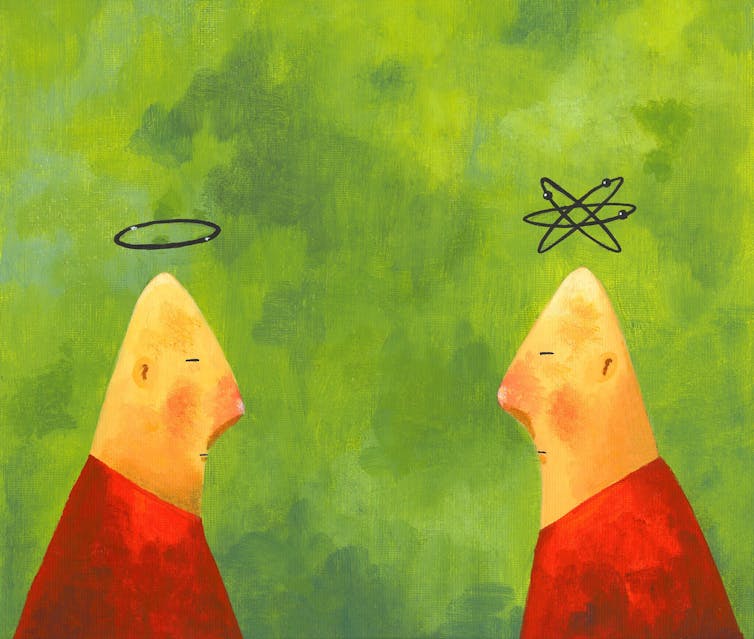Evolution: as a religious professor of science education, I believe we should rethink how we teach it
By Blog Editor, IOE Digital, on 11 June 2019
 Max4e Photo/Shutterstock
Max4e Photo/ShutterstockEvolution is near universally regarded by the scientific community as a cornerstone of modern biology. Treating it as anything other than incontrovertible fact can therefore incur the wrath of scientists, who highlight the extensive depth and breadth of robust scientific evidence supporting the theory.
But the fact is that a large number of young people are reluctant to accept evolution. In the UK, 10 to 15% of students feel this way. The percentage is even higher in many countries – in the US, a country with a high proportion of practising Christians, it’s as high as 40%.
As both a professor of science education, with research expertise in evolutionary biology, and a priest in the Church of England,
I believe that we need to rethink the way we teach evolution. I’ve spent 30 years teaching evolution to school students, undergraduates and teachers in training. It is clear to me that the way the subject is typically taught in schools can force religious children to choose between their faith and evolution. This is as true for Christian students as it is for Muslims, Orthodox Jews and members of other religions.
Aware of these potential conflicts, many teachers cover the topic incompletely or avoid it entirely. For those who do teach it, evidence suggests that the majority do not view evolution as a “delicate” or “sensitive” matter. This can lead to teaching techniques that directly challenge personal faith, causing upset and anger. In some cases, students may refuse to engage with a lesson. Ridicule from fellow students also often follows, driving a divide between young atheists and religious youth in a world increasingly characterised by religious tensions.
 Without care, teaching evolution can drive divides between young atheists and children of faith.Rido/Shutterstock
Without care, teaching evolution can drive divides between young atheists and children of faith.Rido/ShutterstockI propose that a way forward may be to teach evolution as a sensitive issue.
A teacher who approaches evolution in this way is respectful of their students’ beliefs and attentive to their emotional states, rather than dismissing them as “silly”, “ignorant” or “causing problems”. Such teachers would employ teaching approaches that embrace diversity, address classroom bias, and hold in conscious awareness the individual experiences of students. These techniques are commonly used when teaching sensitive issues such as sex, pornography, ethnicity, religion, death studies, terrorism, and others.
Teachers would still cover the full range of content when teaching evolution. However, when, for example, teaching about how humans and other mammals share a common ancestor, they would not actively seek to establish agreement among all students. When running a group exercise about the age of the Earth, they might use clicker technology that anonymises responses.
The aim of evolution education
Though more work needs to be undertaken to test the effect of shifts in teacher approaches, teaching evolution in this way is likely to help some students to consider evolution as a possibility who would otherwise not do so. People are more open to change when not put on the defensive.
 Religion and evolution: not as incompatible as you might think.bora ozen/Shutterstock
Religion and evolution: not as incompatible as you might think.bora ozen/ShutterstockAs a science educator, I believe in taking seriously and respectfully the lived experiences of religious students. It is not the role of educators to forcefully convert doubters into accepting evolution, but to build an inclusive classroom that encourages those less comfortable with the concept to willingly engage with it. What is important is that all students can explore and understand the theory in a context that doesn’t force them to choose between science and their religious beliefs.
Evolution does not need to be incompatible with faith. Good science teaching can be invaluable in helping students resolve any perceived conflict, at a crucial age that shapes how they see and interact with the world. I want everyone to be able to experience the same fascination that I did when I learnt about how fossils are formed, and how natural selection works. Whether it awakens scientists who would have otherwise turned elsewhere, or simply helps students to understand one another, rethinking how we teach evolution can only be a good thing for society.
Michael Reiss, Professor of Science Education, UCL
This article is republished from The Conversation under a Creative Commons license. Read the original article.
One Response to “Evolution: as a religious professor of science education, I believe we should rethink how we teach it”
- 1
 Close
Close




I believe this issue, more than at any time before, is one crying out for a resolution. It is interesting that you conclude ‘I believe that we need to rethink the way we teach evolution.’ Presumably, this is not because there is something fundamentally challenging about the science of evolution. If that is the case then it would suggest to me that the way religion is taught, especially in schools, has more to do with any conflict of understanding than the fundamental science behind evolution.
You write, ‘the way the subject is typically taught in schools can force religious children to choose between their faith and evolution’. If this is the situation, it should not justify the notion that ‘many teachers cover the topic incompletely’. Such an approach offers no solution.
I cannot recall ever having felt it necessary to ‘actively seek to establish agreement among all students.’ on any aspect of the taught curriculum. I never believed it was my role as a teacher to ‘force’ students to adopt any facts, ideas, concepts or beliefs, rather to expose them to new ideas and knowledge with the tools necessary to eventually develop their understanding of the world. It’s my view that the curriculum is a vehicle for exposing young minds to the wonder of the natural world and the rich diversity of its peoples without straying into religious fundamentals. The reality, I believe, is that evolution is incompatible with faith. In my opinion, it is the attempt to reconcile this that creates the problem you speak of.
The skill of encouraging students to engage with others is not confined to the teaching of evolution. Engaging students in their learning is central to the craft and science of teaching. However, there can indeed be no doubt, ‘It is not the role of educators to forcefully convert doubters into accepting evolution,’ any more than it is to force them to accept any other fact of nature.
If we were to agree that reconciling matters of faith enshrined in religious beliefs held with conviction by those of all faiths with society’s role of fully educating all its young people, I suggest there is a way out of this that does not require young people to choose between their faith and evolution. I suggest that could be achieved by accepting there is a divide.
A colleague of mine Roger Titcombe recently posted three articles on Local Schools’ Network website which explores this and related subjects.
https://rogertitcombelearningmatters.wordpress.com/2019/05/26/priests-parents-or-the-state-who-should-be-responsible-for-childrens-education-part-1-the-role-of-religion/
My personal contribution to his posts date is to question whether in a pluralistic society there is a role for religious teaching in our schools. In it I write, ‘As to the role of religious teaching in any form in education, it should play NONE.’ This does not mean that religious education might find no place in the curriculum, but rather that religious teaching be confined to the historical facts of all the faiths. Surely, it is the role of the family and the different religions to educate young people as they see fit in line with the laws of society, hopefully with the avowed intention of helping to unite our otherwise divided world.